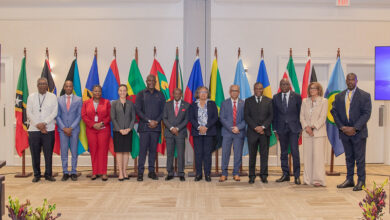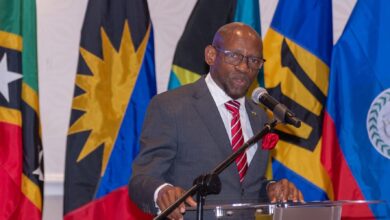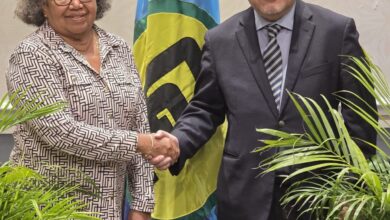Honourable Dr Denzil Douglas, Prime Minister of St Kitts and Nevis
Honourable Baldwin Spencer, Prime Minister of Antigua and Barbuda Honourable Sam Condor, Deputy Prime Minister and Chairman of COFCOR Distinguished Ministers of Foreign Affairs of CARICOM Member States Distinguished Guests Senior Officials and Delegates of Member States of CARICOM Member States Staff of the CARICOM Secretariat Representatives of the Media
We meet at a time when our Region finds itself in an environment of change and transition within the context of a global environment which is itself dynamic and rapidly changing. In this context, the entire Community is engaged in a period of profound introspection, constructive self-criticism and creative problem solving.
The Twenty-Second Inter-Sessional Meeting of Heads of Government, the Special Meetings of the Community Council and of the Council for Foreign and Community Relations (COFCOR), all held earlier this year in Grenada, began the process of reviewing our strategies and policies to help our Community successfully navigate and emerge stronger out of this period of change, opportunity and challenge. This process continues both at this 14th Meeting of the COFCOR and at the Special Retreat of Heads of Government to be held in three weeks time in Guyana.
Survival in the current global environment demands a commonality of ambition and vision to ensure the strategic positioning of the Community in the hemispheric and global arena through the effective coordination of its external relations.
It is through diplomacy that small states such as ours make our mark on the international community. It is the force of ideas and creativity that are our strengths as we grapple with the issues and attempt to make a difference in the international arena. It is the use of these strengths that give our small states a voice on equal terms with the most powerful states to advance those issues which are of particular concern to us. In pursuing that path of diplomacy, the Caribbean Community must utilise all its tools and skills adroitly and none more so than the co-ordination of its foreign policy. This important weapon in the diplomatic arsenal of the Community is one of the four pillars on which this Community rests.
The strength of a co-ordinated approach has been most aptly demonstrated recently in our successful attempt to focus the world on the threat of chronic non-communicable diseases. It is as a result of our co-ordinated diplomatic advocacy that the United Nations High Level Meeting on Chronic Non-Communicable Diseases is being convened next September.
CARICOM’s development agenda is no doubt ambitious and rightly so, if we are to overcome the challenges before us globally and also meet the rightful aspirations of our citizens. The Single Market and Economy remains on the Community’s front burner – our aspirations to ensure the physical and socio-economic security of our citizens, rest in large measure on its successful implementation. Yet its advance is under constant threat. The challenges of the global financial and economic crises which continue to impact disproportionately the small highly indebted middle income countries that comprise our membership, the negative consequences of climate change and the increasing challenges to our security are just some of the menaces in its path.
It is on such critical issues that the COFCOR has a duty to focus its attention as it constantly reviews and enhances its strategy for engaging Third States and the international community in general in a co-ordinated fashion. It has a pre-eminent role in ensuring that the Region’s positions and interests on these issues are appropriately represented, articulated and advanced in the relevant fora.
This Meeting of the COFCOR is therefore tasked with discussing mechanisms for further strengthening its foreign policy coordination, as well as with reviewing the Community’s relationships with both our long-standing as well as our more recent partners. This is with a view to determining the most appropriate strategies for enhancing these relations and for protecting and advancing the Community’s strategic interests.
It is no secret that our track record to date in a coordinated approach to foreign policy has earned us the respect and admiration of the international community for our independence of thought and adoption of sometimes controversial, yet courageous positions. In recognition of this, some twenty-two (22) foreign countries have accredited plenipotentiary representatives to the Caribbean Community and the Region’s principled positions and quiet, small-state diplomacy continue to stand us in good stead. Over the last decade, CARICOM’s traditional slate of strong partners such as Canada, Cuba, the European Union and its Member States, including Spain and the United Kingdom, Japan, South Africa and the United States has expanded to embrace such key partners as Australia, Brazil, and India, to name but a few.
Today we welcome and acknowledge the presence of the Foreign Ministers of Australia and Slovenia as well as Special Envoys from Azerbaijan, Hungary and South Africa. We have had the privilege of meeting with the Foreign Minister of Australia within the context of COFCOR in Dominica in May 2010 and again in the margins of the United Nations General Assembly last September. We look forward to engaging with him soon again in the margins of the Commonwealth Heads of Government Meeting scheduled for later this year in Perth, Australia. Mr Rudd has assured us that Australia is with us for the long haul.
The COFCOR, I am sure, is acutely aware that development is more effectively pursued through strategic alliances with like-minded countries and states and must continue its efforts to perfect the management of these relationships to ensure that our partnerships are mutually beneficial. Most importantly, these alliances and partnerships must redound ultimately to the benefit of the citizens of the Community.
I extend warm congratulations and appreciation to the Government of St. Kitts and Nevis for the excellent arrangements made for this Fourteenth Meeting of the Council for Foreign and Community Relations (COFCOR). We are looking forward to being in St. Kitts and Nevis again on the occasion of the Thirty-Second Meeting of the Conference of Heads of Government in July and this august gathering of Foreign Ministers represents an excellent precursor to that event.
Ministers, distinguished guests I welcome you to the Fourteenth Meeting of COFCOR and look forward to robust and rich debate on these important issues.






